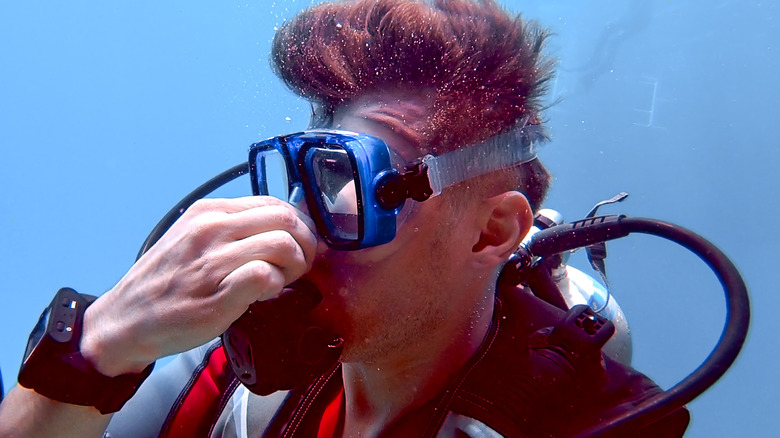What Happens To Your Brain When You Hold Your Breath?
Much like thumb wrestling or relay races, seeing who could hold their breath longest was a competitive activity enjoyed by many young kids growing up. As we got older, however, breath-holding became less about contest winning and more about survival. For anyone who has ever taken swimming lessons, you know how important it is to be able to hold your breath to maintain safety while in deep water. We know our brain needs an adequate supply of oxygen to function properly, so what happens when we cut off that air supply?
Experts at the Centers for Respiratory Health explain that oxygen is essential to the brain's ability to regulate our everyday physical and mental bodily functions. Motor ability, memory, perception, problem-solving, emotional regulation, and information processing are just a few of the seemingly endless responsibilities of the brain. When we deprive our brain of oxygen for long periods of time, we run the risk of doing damage to essential organs.
The average healthy adult can hold their breath for a duration of roughly 30 to 90 seconds (via Medical News Today). According to The Ohio State University Wexner Medical Center, when holding our breath for short periods of time, there is generally no cause for concern because our bodies have protective mechanisms in place to keep all essential organs operating as normal during brief moments of oxygen deprivation. But holding our breath for extended periods of time can potentially be much more dangerous.
When holding our breath, we run the risk of fainting, seizures, and brain damage
When holding your breath, an imbalance occurs between the body's inhalation of oxygen and exhalation of carbon dioxide. With no new oxygen intake, and nowhere for the carbon dioxide to be expelled, it can result in loss of consciousness as well as seizures (via The Ohio State University Wexner Medical Center).
Depending on the length of time spent holding your breath, side effects may differ in severity. According to experts at SpinalCord.com, starting at just half a minute, one is susceptible to fainting. By one full minute, we begin to lose brain cells. At the three-minute mark, we run the risk for permanent brain damage. Between five and fifteen minutes, the average person is unlikely to survive.
But what about those breaking news stories featuring people who are able to hold their breath for over 20 whole minutes (via Science Channel)? In these instances, such as in the case of expert divers or experienced mountaineers, these individuals have often undergone rigorous training exercises, usually under the supervision of a trainer or medical professional (via Medical News Today). Therefore, if you are looking to increase your lung capacity, be sure to do so under the watchful eye of a knowledgeable instructor.


